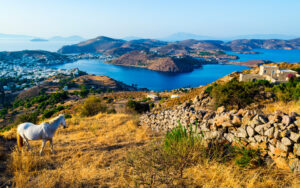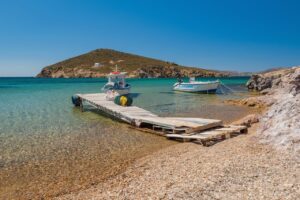Patmos in Bloom: A Joyful Call for Bio-Tourism and Living in Harmony with the Land
There are places on this Earth that seem to carry an echo of something sacred. Patmos is one of them. With its windswept hills, crystal-clear bays, terraced slopes, and timeless white-washed villages, the island offers not just beauty—but a deep, living presence. It invites stillness, wonder, and reverence.
And yet, this extraordinary island, known for its spiritual legacy, now stands at a crossroads. The modern demands of short-term tourism—concentrated into a frantic eight-week summer window—strain not only the people but the very land itself. It is time for Patmos to return to its essence. To listen to its natural rhythms. To become a beacon of something far more enduring: sustainability, regeneration, and harmony with nature.
Imagine a Patmos where bio-tourism flourishes. Where visitors come not to consume the island, but to learn from it. To walk the ancient footpaths and understand the herbs growing wild beneath their feet. To meet farmers who tend the land not with chemicals, but with knowledge passed down through generations. To witness water conservation projects that respect the dry climate. To explore terraced gardens built in the principles of permaculture—where vegetables, flowers, and olive trees grow together in thriving harmony.
Such a shift isn’t just possible—it’s already beginning in small ways. More and more people are seeking experiences that nourish them and leave the places they visit better than they found them. Patmos can lead this movement in the Aegean by opening itself to slow tourism, regenerative farming, and ecologically mindful hospitality.
Workshops in organic gardening, composting, natural building, herbal medicine, and water-saving techniques could attract a whole new kind of visitor—curious, conscious, and committed to treading lightly. The same guests who come for spiritual retreats and cultural seminars are often the very people who would joyfully support and participate in a greener, more sustainable Patmos.
Local homes and businesses can shift toward solar power, rainwater harvesting, and plastic-free practices. Restaurants can celebrate island-grown ingredients and traditional recipes made with care. Local artisans, beekeepers, and olive oil producers can thrive, sharing their crafts and stories with guests who truly listen.
This is not a step backward—it is a leap forward. A forward that honors the land instead of exhausting it. A forward that keeps the waters clean, the air clear, and the landscape alive for generations to come. A forward that returns Patmos to what it has always quietly been: a sanctuary.
The joy of living in alignment with nature is contagious. It uplifts communities. It heals ecosystems. And it offers visitors something rare: not just a vacation, but a homecoming.

Let Patmos be that lighthouse in the Aegean once more—not only for pilgrims of faith, but for pilgrims of the Earth, seeking a new way to live. A joyful, sustainable, and deeply rooted future awaits—if we choose it. And Patmos, in her quiet wisdom, is ready.